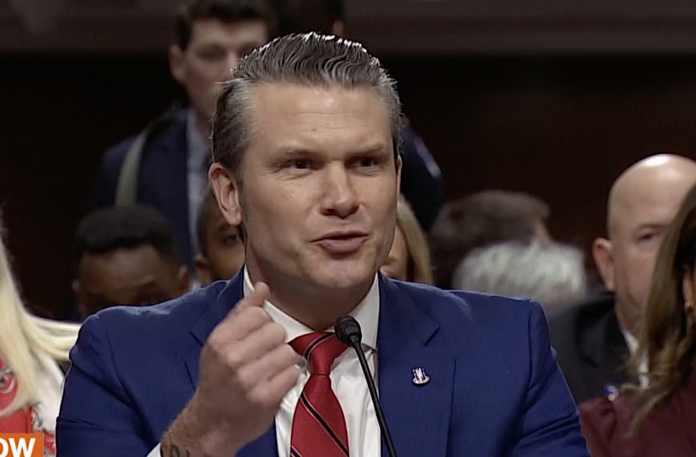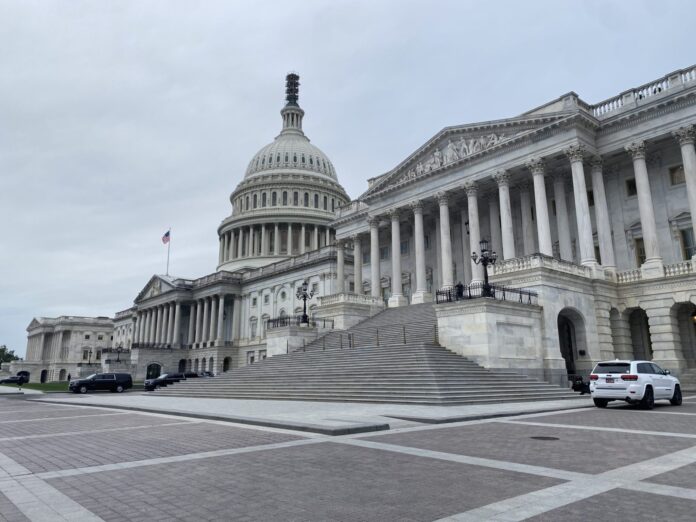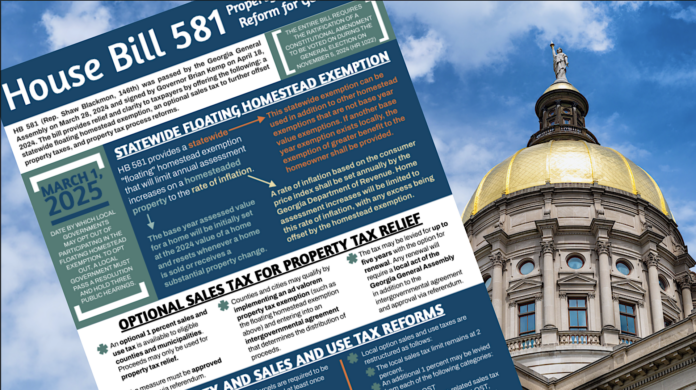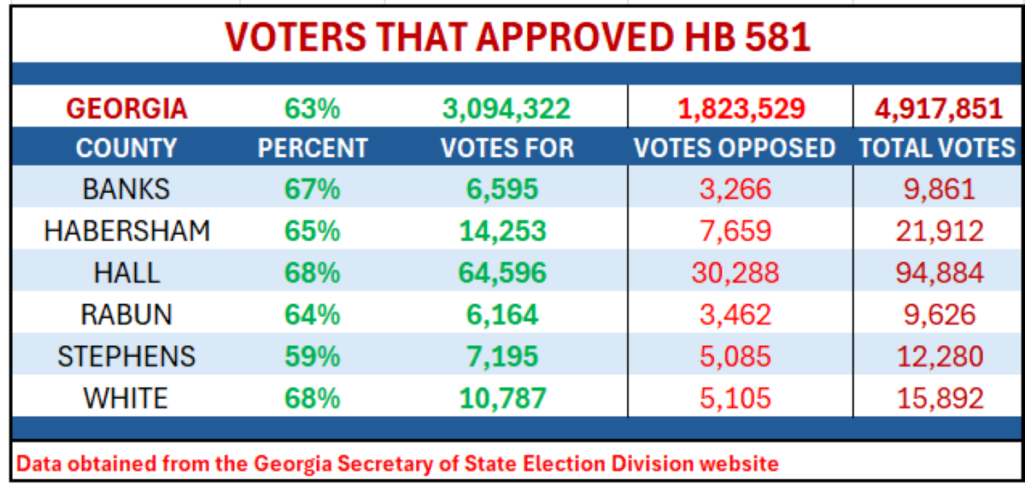(Georgia Recorder) — Just a few days into Georgia’s 2025 legislative session, proposed new limits on lawsuit awards is a priority trumpeted by business groups, some lawmakers and the governor alike as one of the top issues of the year.
At last week’s State of the State address, Gov. Brian Kemp emphasized the importance of passing legislation to transform Georgia’s legal landscape by the end of the 2025 session in early April, citing a rise in insurance rates or difficulty acquiring coverage that he says threatens businesses across the state.
“Small business owners reported insurance premiums up anywhere from 30% to over 100% over the last few years, costing them hundreds, hundreds of thousands or millions or more just to get basic coverage,” he said during his address. “For too many of them, that meant holding back on hiring more employees, waiting to grow their business, or making difficult decisions about whether or not they could even keep the lights on. For others, the biggest problem was a complete lack of insurance options or the threat of paying thousands or millions to fend off excessive lawsuits.”
Proponents of overhauling Georgia’s legal landscape say they aim to create more balance between plaintiffs and defendants in Georgia’s court system, often citing an American Tort Reform Foundation ranking which listed Georgia as one of the top five “judicial hellholes” in the country in 2024.
Kemp has yet to release a specific policy proposal, but a recent report from Georgia Insurance and Safety Fire Commissioner John King could point to the direction state leaders will take in pursuing changes. The report, commissioned as a result of last session’s Kemp-backed House Bill 1114, initiated a data-collection effort designed to examine Georgia’s current insurance landscape and make recommendations to make the balance of power more friendly to business.
But proponents of the yet-to-be-detailed proposals will be up against Georgia’s civil trial attorneys – some of who serve in the Legislature – and others who are wary of changes that limit access to justice for aggrieved Georgians.
Here are some of the report’s recommended policy changes.
Limiting ‘nuclear verdicts’
One of the most significant changes pushed by the Georgia Chamber of Commerce is limiting “nuclear verdicts” — or damages that exceed $10 million.
Anecdotal evidence cited in the report argues that legislation limiting non-economic damages — such as money awarded for pain and suffering — may help reduce the frequency of large payouts, which business leaders argue are driving up insurance costs across the board.
“An insurance claim is, ‘you won the lottery,’ and we have to change that back,” King said at the Georgia Chamber of Commerce’s annual Eggs and Issues event last week. “This is to fix your damages, to get you back on your feet, to take care of your injuries, but this is not a lottery.”
One proposal to reduce large jury awards is to limit the use of “anchoring” — or allowing a plaintiff’s lawyers to suggest a monetary value as proposed compensation for pain and suffering. The practice is explicitly outlined in Georgia code, but advocates for limits on lawsuit awards argue that it sets the stage for juries to hand unreasonably high damages to plaintiffs.
“Georgia is one of the only states having a specific statute that allows ‘anchoring,’” the commissioner’s report says. “These unique factors and the increase in nuclear verdicts are reasons why Georgia continues to be identified in the American Tort Reform Association’s ‘Judicial Hellholes’ report as the nation’s most problematic jurisdiction.”
However, Democrats pushed back on the assertion that substantial lawsuit awards are a significant driver of insurance rate increases.
“What we really have to understand is, is there integrity in their position on why rates keep rising for Georgians?” said Rep. Tanya Miller, an Atlanta Democrat who serves as chair of the House Minority Caucus. “It is not, I think, accurate to say that jury verdicts are the sole reason for why insurance rates are rising. I would like to see a robust discussion had about whether and how insurance companies are forced to be transparent when they raise their rates on our citizens.”
Former state Rep. Matthew Wilson, a personal injury lawyer in Atlanta and member of the Georgia Trial Lawyers Association’s executive committee, also questioned the commissioner’s report.
“To put it bluntly, I think the insurance commissioner’s data analysis is a sham, and we are all being lied to,” he said, adding that the data collected from insurance companies did not support some of the report’s conclusions.
“One of the big claims that this report says is there’s a crisis of increased [insurance] claims,” he said. “And I think one of the big data points that a number of folks have latched onto here is that there’s been a 25% increase in the number of claims over this 10-year period. But what the commissioner’s report fails to do is to adjust that data for population growth, and when that is adjusted, what the data shows over that 10-year period is that actually, claims have been relatively stable and if anything, they’re slightly decreasing in recent years.”
The Georgia Trial Lawyers Association is hoping to collaborate with the governor’s office and state legislators to craft policy proposals that are fair to both sides, Wilson said. But reforms that limit consumers’ constitutional rights are “going to be a non-starter,” he said.
Limiting liability on private property
Legislation that limits lawsuits against business owners for accidents that occur on their property might be another tactic that lawmakers pursue during the 2025 session.
There have been recent multimillion dollar settlements awarded in Georgia, including a $16 million verdict against Amazon in 2022, and a $45 million verdict against CVS that led the Georgia Supreme Court to set a new precedent on the kinds of evidence that juries can account for when awarding damages.
Chris Clark, the president and CEO of the Georgia Chamber of Commerce, said overhauling the current premises liability rules will be one of his organization’s top priorities going into the 2025 legislative session.
“It shouldn’t be legal for two bad guys to come on your property, hurt each other and then you’re to blame and you get sued for it,” he told reporters during the chamber’s Eggs and Issues breakfast.
Limiting third-party lawsuit funding
While some aspects of the proposed lawsuit litigation overhaul are Georgia-specific, attempts to regulate the use of third-party sources of funding for lawsuits are popping up nationwide. The use of third-party funding for damages lawsuits is a multibillion dollar industry, according to the U.S. Chamber of Commerce, and works by allowing hedge funds and other investment groups to finance lawsuits in exchange for a portion of anticipated damages awarded to the plaintiffs.
Critics of the practice, which is sometimes referred to as champerty, say that it allows private equity groups to exert influence over trials, and may give foreign actors access to sensitive information they would not otherwise be able to obtain. Plaintiffs are also not required to disclose the use of outside funding, allowing these subsidies to go unregulated.
Third-party litigation funders are “not just trying to help people win, they’re trying to collect big rates of return on their investments in suing insurance companies,” said Harold Weston, a business professor at Georgia State University who serves as director of the undergraduate risk management and insurance program. “That’s not the way it should work.”
States including Indiana, Louisiana and West Virginia all passed new restrictions against the practice in 2024, requiring plaintiffs to disclose any use of third-party funding. Weston said that adopting similar reforms in Georgia could give both judges and juries a clearer sense of what forces may be influencing a case before deciding whether to award damages.
“Juries don’t know this,” he said. “Courts often do not know this, because these investors — third party finance — are not disclosed to any of them.”














